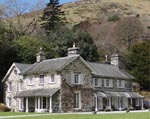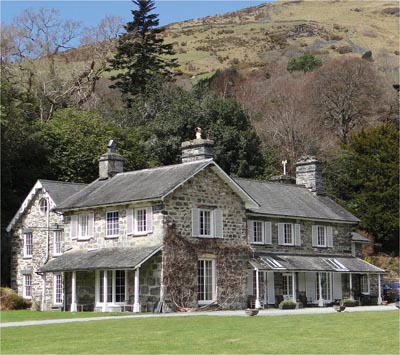Peniarth Uchaf country house, Wales
This charming house, set within the stunning Snowdonia National Park, could be a magical home for anyone who loves the countryside


There was an extraordinary clarity about the sky above Peniarth Uchaf, which nestles in an 18th-century landscape of rhododendrons, camellias and towering trees, in a fold of the lush Dysynni valley, a few miles inland from Cardigan Bay in the quiet south-west corner of the Snowdonia National Park.
It was one of those rare, but magical spring mornings, when the only sounds were the birdsong, the bleating of newborn lambs so impossibly white that they must have been tumbledried, and the rush of the sparkling River Dysynni as it passed through the estate on its way to the sea. In short, it was one of those days that reminded Peniarth Uchaf's owners, Norman and Alison Corbett, who took on the family property in poor repair in 1978, why they've worked so hard all these years to keep everything together.
But time is no longer on their side, and with the house and estate still a ‘work in progress', Maj and Mrs Corbett have reluctantly decided to pass on the baton. Consequently, Strutt & Parker in Chester (01244 354880) have been called in to find a buyer for the idyllic small country estate at a guide price of £1.25 million for the Grade II-listed main house, two holiday cottages and 61-and-a-half acres of gardens, parkland and woodland; £420,000 for Tyn-y-Cornel farmhouse with 10-and-a-half acres of land, and £75,000 for three miles of doublebank fishing on the Dysynni.

For all its air of pastoral tranquillity, Peniarth Uchaf has seen its share of upheaval over the years. In the early 17th century, the estate was owned by the Owen family, which, according to an entry in the Welsh historical journal Archeologia Cambrensis, followed ‘a course all too common with landowners in Wales', by first mortgaging, then selling their property. The new owner of Peniarth Uchaf was David ap William Reynald, whose family later adopted the surname Williams.
The estate passed through several generations of the Williams family and was owned in the late 1700s by John Williams, who was educated at Eton and Oxford, but spent much of his time (and most of his inheritance) gambling and cock-fighting. The cockpit at Peniarth Uchaf still occupies a prominent position on the hillside overlooking the main house. Williams had another estate near Anglesey, but when he and his wife, Gaynor, both died in 1815, his trustees decided to sell Peniarth Uchaf to provide a start in life for the younger members of their large family.
An auction was held locally, but failed to find a buyer. A second auction was then held at Garraway's Coffee House in Cornhill, London, in July 1818, when Peniarth Uchaf ‘in the romantic Vale of Llanfihangel', was offered for sale with its ‘antient [sic] family residence' and 731 acres of arable, meadow and pasture lands, all let to ‘respectable Tenants, at low rents' and deemed ‘highly improvable'. The estate was bought by Richard Scott,‘a wealthy merchant from Shrewsmain bury' and a scion of the influential Scott family of Scott's Hall in Kent.
A shrewd businessman, Scott had already acquired the manors of Whitley and Welbatch, and the estate of Underdale, near Shrewsbury. When he died unmarried in 1821, he left it all to his grand-nephew, George Jonathan Scott of Betton Strange, Shropshire. Richard was a keen country sportsman and he greatly improved Peniarth Uchaf, buying in more land and extending the modest house built by the Williams family of dour grey stone in the style of Scottish shooting lodge.
Sign up for the Country Life Newsletter
Exquisite houses, the beauty of Nature, and how to get the most from your life, straight to your inbox.
A draft advertisement for letting the house after his death describes it as ‘an elegant stone-built Cottage Villa situated in the most romantic part of Wales', with accommodation comprising a drawing room and a dining room ‘with French windows opening to a veranda, seven good bedrooms and offices fitted up with every convenience' as well as a double coach house and stabling for eight horses.
By the time George Jonathan inherited, Peniarth Uchaf was a thriving sporting estate of some 2,140 acres. On leaving Oxford, the young squire thought about joining the army, but opted for a life of leisure, dividing his time between London and the pleasures of Brighton, when he wasn't in Shropshire or Wales. In 1840, he married Augusta Frances, the daughter of William Wynne, his neighbour in Merioneth. When in the country, Scott did all the ‘smart county things', joining the Shropshire hunt and the South Salopian Yeomanry, and serving as high sheriff for Merionethshire (now Gwynedd) in 1833. Other owners of Peniarth Uchaf to have held that office include William Williams in 1776, William Wynne of Peniarth in 1812, and the current owner, Maj Corbett, in 2009.
When George died in 1875, his daughter Sydney Louisa continued to live at Betton. She married Maj William Edington Stuart in 1868, but when her mother died in 1891, she reverted as a widow to her maiden name of Scott. When her son, George John, died childless in 1937, the Scott properties were left to his sister, Marie Corbett, whose husband, Trevor, was the owner of Longnor, a lovely late- 17th-century house not far from Betton. Her son William was due to inherit Longnor, so she made the Scott estates over to her younger son, Charles, who sold Betton in about 1937, and emigrated to Kenya.
On returning to England in the 1960s, he went to live at Peniarth Uchaf, where he was eventually succeeded by his son, Norman, who wisely decided to extend his career as an officer in the Gurkhas, so as to have an army pension to supplement the income derived from the estate. Despite their enthusiasm, the new owners soon realised that the numbers would never add up. Eventually, Maj Corbett sold off the farm to finance the renovation of the main house, the four-bedroom farmhouse and the two estate cottages-plus the upkeep of the glorious gardens and grounds. The coach house, alas, was a restoration too far and now represents a splendid challenge for a new owner.
For 30 years or more, Peniarth Uchaf has been a haven for discerning visitors who have enjoyed the Corbetts' hospitality, first as a Wolsey Lodge, and latterly as a self-catering holiday complex in the shadow of Bird Rock, where choughs and cormorants live, as they have done for centuries.
* Country houses for sale in Wales
* Follow Country Life property on Twitter
Country Life is unlike any other magazine: the only glossy weekly on the newsstand and the only magazine that has been guest-edited by HRH The King not once, but twice. It is a celebration of modern rural life and all its diverse joys and pleasures — that was first published in Queen Victoria's Diamond Jubilee year. Our eclectic mixture of witty and informative content — from the most up-to-date property news and commentary and a coveted glimpse inside some of the UK's best houses and gardens, to gardening, the arts and interior design, written by experts in their field — still cannot be found in print or online, anywhere else.
-
 Helicopters, fridges and Gianni Agnelli: How the humble Fiat Panda became a desirable, design classic
Helicopters, fridges and Gianni Agnelli: How the humble Fiat Panda became a desirable, design classicGianni Agnelli's Fiat Panda 4x4 Trekking is currently for sale with RM Sotheby's.
By Simon Mills Published
-
 What's a 'wellness village' and will it tempt you back into the office?
What's a 'wellness village' and will it tempt you back into the office?The team behind London's first mixed-use ‘wellness village’ says it has the magic formula for tempting workers back into offices.
By Annunciata Elwes Published
